Chloé Arnold ’02 and Maud Arnold ’08 are tapping into the sensibility of the next generation.
Columbia College | Columbia University in the City of New York
Chloé Arnold ’02 and Maud Arnold ’08 are tapping into the sensibility of the next generation.
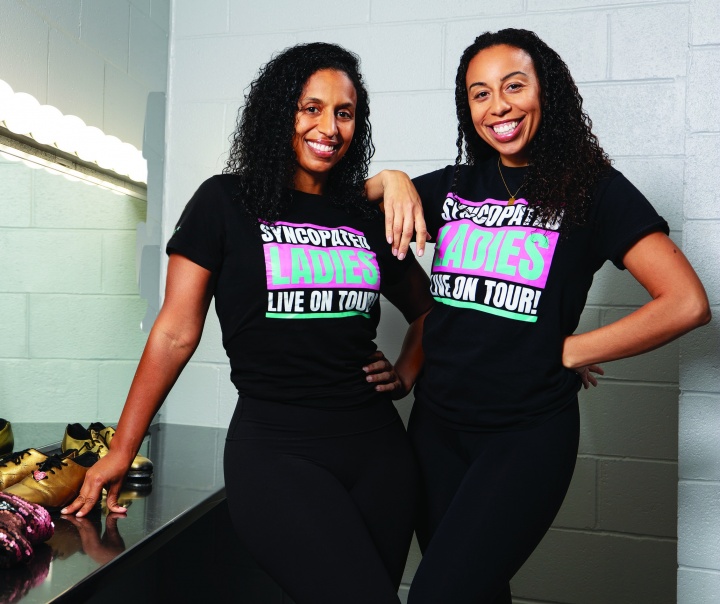
Chloé Arnold ’02 (left) and Maud Arnold ’08
JÖRG MEYER
How about two? Any women?
Chloé Arnold ’02 and Maud Arnold ’08 have been asking people these questions for years. The answer — if there’s an answer — is often Gregory Hines; on occasion, Savion Glover. For those who like a throwback, it might be Fred Astaire in his top hat or Gene Kelly singing in that rain.
Four names, all of them men. The Arnold sisters are not here for that.
What they are here for — as they make clear on a March night at the Staller Center on Long Island — is to turn tradition on its head. They are here to bring joy and uplift. They are here to rock. As part of Syncopated Ladies, they deliver 90 minutes of gloriously raucous tap, choreographed to familiar pop hits. That’s not to say there aren’t softer routines, even one a cappella number. But most of the time they stomp, shuffle and flap — in solos, duets and as a fivesome — with a fierceness and energy to rival any athlete.
The Arnolds have built a dedicated fan base online, dropping highly stylized dance videos several times a year. Two of the best known are set to Beyoncé: “End of Time,” which catapulted the sisters to viral status after Queen Bey herself shared it on Facebook, and “Formation,” whose popularity has earned the routine a place as the show’s closing number.
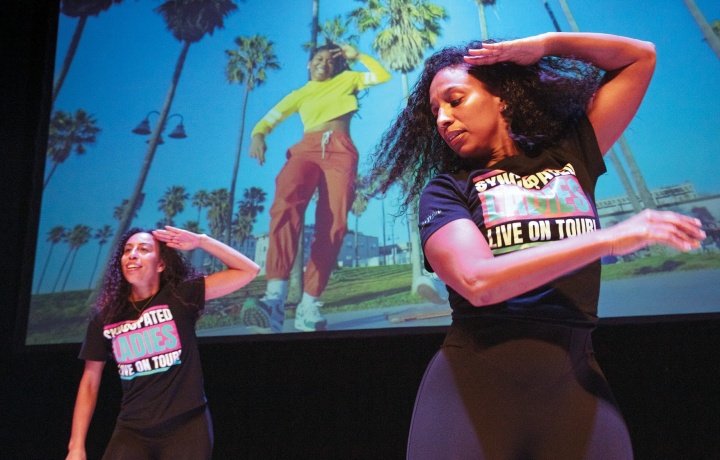
Refining choreography during sound check before the Syncopated Ladies’ March show at the Staller Center.
“And then to spend time with [audience members] afterward,” she adds, referring to the hours-long meet- and-greets that follow every performance. “The stories and feedback that we get, whether this is someone’s first time seeing tap or they’ve been following us forever. We consistently hear that people feel affected, empowered and ready to go for their dreams.”
Today, Syncopated Ladies represent just one facet of the sisters’ ever-expanding repertoire. Both choreograph for TV and film; Chloé was behind the Scroogey musical Spirited and Maud, the buzzy song-and-dance mockumentary Theater Camp. They are also entrepreneurs, with a branded clothing line as well as a partnership creating tap shoes with Bloch (the Nike of dance footwear). And they helm the Chloé & Maud Foundation, which provides dance and entrepreneurship programming in underserved communities.
Significantly, tap is both music and dance; for the Arnolds, that duality offers a heightened capacity for impact. “It’s a double way to reach people,” Chloé says. “And that’s very, very special.”
The Arnold Sisters have six years between them. It’s easy to read who’s the big and who’s the little sister — backstage for a photo shoot, Chloé gets parental, taking a final few seconds to adjust Maud’s outfit, directing her attention away from her phone. Chloé comes across as softer spoken, whereas Maud is quick to talk and quick to laugh, with a rasp to her voice that suggests she does plenty of both. Professionally, their roles reflect their passions: Chloé is the ideas person, a creative who’ll stay in the studio until all hours cutting a music mix or perfecting choreography. Maud leans toward the business side, a doer who writes grants and wrestles with logistics and generally figures out how to get everything done.
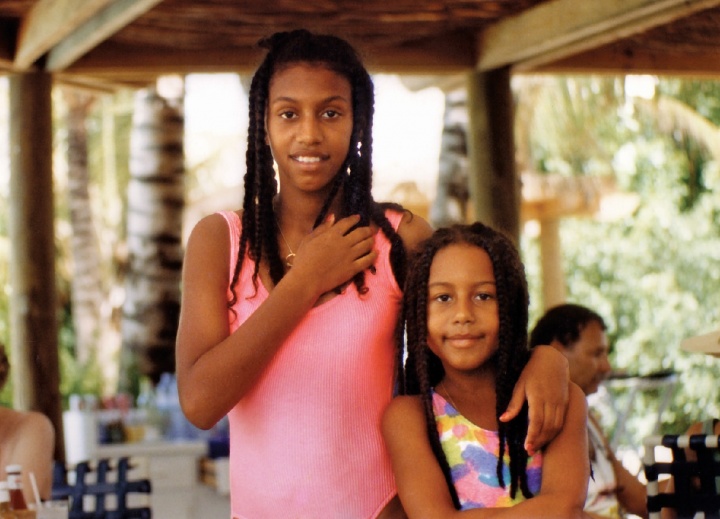
Chloé (left) and Maud at ages 13 and 8.
COURTESY CHLOÉ ARNOLD ’02 AND MAUD ARNOLD ’08
The Arnolds were raised in Washington, D.C. Their father was a jazz aficionado who worked in public relations; their mother, from France, was a high school teacher. The two split when Chloé was 13 and Maud 7, and the girls and their brother moved with their mom into a small apartment. Money was tight, and publicly funded programs — often supported by the National Endowment for the Arts — were key to their dance education. They took master classes with the Nicholas Brothers and Gregory Hines, saw and danced in shows at the Kennedy Center and through the nonprofit Washington Performing Arts. More than that, Chloé says, “Art really saved our lives as kids. We were growing up in D.C. during the crack era, and it took us out of a challenging and tough city life.”
Chloé fell in love with the form at age 9 after seeing the Hines film Tap. “When I think about why that spoke to me, it’s because he was dancing to funk music,” she says. “He made tap cool. I couldn’t wait to learn more.” For Maud’s part, she’d often tag along when Chloé was at the dance studio. “Finally they just gave me a scholarship,” she says with a laugh. “They said, ‘You’re here anyway, you might as well dance.’”
Debbie Allen, the actress and dancer of Fame fame, became a formative influence starting in the late ’90s, when she was an artist in residence at the Kennedy Center. Her first impression, however, was how the sisters handled not being chosen for one of her shows. “They were full of energy and light and joy, even though they didn’t make it,” Allen says. “They wanted to know what to do. By the time they came back, they were twirling, bouncing off the walls. I was like, ‘Hurry up and cast these children.’ They were so full of purpose. They knew. Their focus was on hitting their mark and the success of where they had to be so we could be in the room together. And they have not left the room since.”
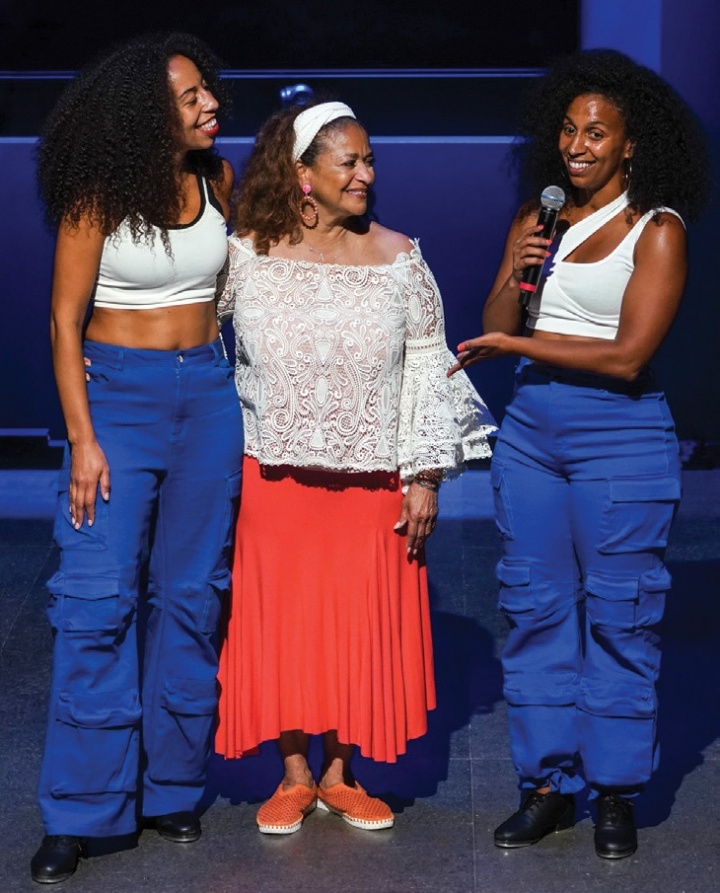
With their mentor, actress and dancer Debbie Allen, in 2023.
LEE TONKS PHOTOGRAPHY / COURTESY CHLOÉ AND MAUD FOUNDATION
The mentorship deepened and ultimately extended to both sisters. (Chloé lived with Allen when she first moved to Los Angeles; Maud taught at the Debbie Allen Dance Academy.) Among the most valuable lessons that Allen imparted, they say, was to be versatile and to learn how to tell stories — “because if you’re always waiting for others to cast you, you might be waiting a long time.” To wit: both majored in film at the College. “The other students wanted to become Scorsese,” Chloé says. “My entire point was to see dance on TV and in film.”
Allen also urged them to push against the status quo. At the College, Chloé became aware of the contrast between her drive to learn tap history and internalize its connection to jazz — she’d go to Greenwich Village clubs with her tap shoes and ask to join the band — and what she loved to do after hours. “I’d be out dancing to all the popular music until the sun came up, having the time of my life,” she says. “I eventually realized, what I was doing as a person was not what I was doing as an artist.” Allen’s was the voice of encouragement to try something different in her choreography — in Chloé’s words, “to make it ‘now,’ make it of the moment; make it what you feel and what you like.”
Chloé started Syncopated Ladies in 2003, inspired by an absence she noticed on Broadway. “I was not seeing Black leading female tap dancers in any shows and I thought, ‘There’s no outlet for me,’” she says. “We were just building out this idea that our voices mattered.”
Allen let Chloé use her L.A. studio space as a home for the nascent group. At the time, troupe members ranged in age from 12 to 22; Maud, then a high school junior and still in D.C., joined, too. “They jammed all the time, but I didn’t feel away from the group because when we did shows, I was around,” she says. “It felt like this grand unification of women coming together for a super-special event.”
Even as Syncopated Ladies was finding its footing, the Arnolds pursued other opportunities. Maud enrolled at the College and, as a sophomore, started interning for music video directors, working with the likes of Lil Wayne, Busta Rhymes and Mary J. Blige. In 2006, through Maud’s connections, Chloé landed a gig tapping in a video for dancehall artist Sean Paul. Though Chloé’s part in the final cut was relatively short, she was moved to create a longer routine for Syncopated Ladies. “It was the first time that I saw my expression of tap in a music video — an official one with a real pop star — and then to translate that into what we were doing, that could be per- formed on stage. The feeling was unreal. I knew I wanted to do it again.”
It would still be seven years before the ladies’ big Beyoncé breakthrough. In the interim, the Arnolds launched an early version of their business, Chloé and Maud Productions. They also continued working in the music video industry, as production and director’s assistants, honing their skills and gaining the confidence to do it for themselves.
Then, in 2013, after debuting a video to Rihanna’s “Where Have You Been,” they choreographed one for Bey’s “End of Time.” With a share and a comment from the Queen herself — “They killed it” — the Arnolds’ lives were changed. Today, their videos have garnered more than 200 million views online.
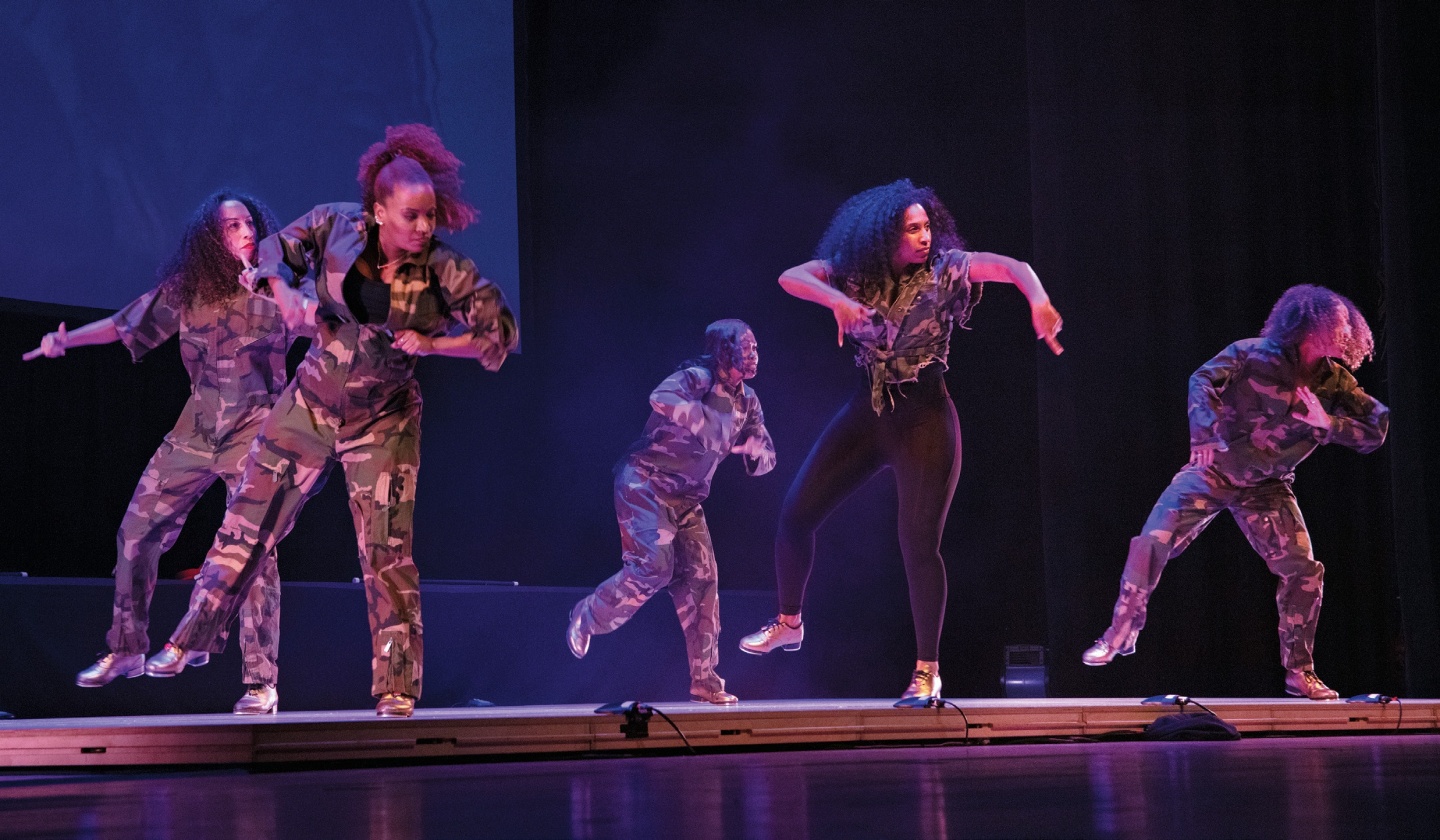
Stomping it out to Ciara’s “Like A Boy.”
For the Arnolds, tap is karma, an uplifting and empowering force that can transform lives. They brim with gratitude for the role models and opportunities they’ve had. And they want to put that tap-positive energy back into the world.
Largely, that happens through their Chloé & Maud Foundation. The Arnolds launched the organization in 2014, though some of its work predates its existence — most notably, the annual DC Tap Fest, now in its 17th year. The festival is the largest of its kind in the world, open to all ages and levels. The schedule is a packed eight days of classes in tap, film and entrepreneurship, panel discussions, dance battles, jam sessions and more.
Other programs include Hollywood Tap Fest, co- produced with Allen; Sole Talk, an international youth tap company that goes beyond dance to do self-esteem building and community service; and Tap Into Life, free, after-school programming for underserved students in Washington, D.C., Los Angeles, Brazil and Cameroon.
The Arnolds are also big believers in mentorship. “Once you dance in any of our programs, you become part of our tap family, filled with incredible roots and branches,” Chloé says. “We aim to connect the dots as best we can.”
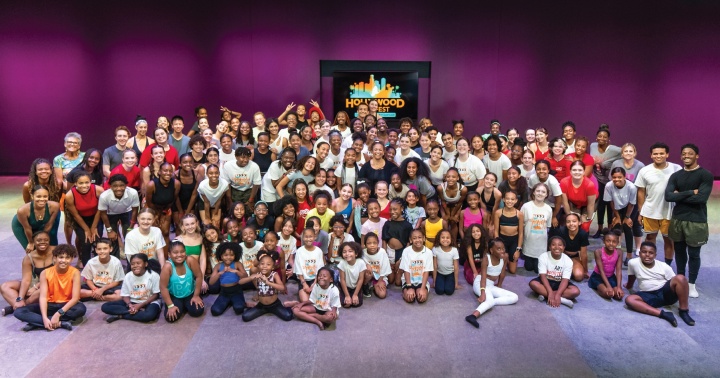
Hollywood Tap Fest is entering its third year, with programming for all ages and experience levels. Highlights include dance battles, jam sessions, and courses in self-esteem and entrepreneurship.
LEE TONKS PHOTOGRAPHY / COURTESY CHLOÉ AND MAUD FOUNDATION
Indeed, Allen says that one of their most significant contributions “is opening the technique and the art form to young people by encouraging the combination of music — that tap is pop music, is hip hop music, is any music.
“They have been the fusion of the classic art with the contemporary music, and where the sensibility is of young people today,” Allen says. “That’s what we need.”
The Arnolds take great care to credit their core team, a “small but mighty crew of amazing women,” Maud says.
“Everyone does about 12 different jobs.” After the show on Long Island, the tour continued in New Haven, Conn., a total of 17 cross-country dates that wrapped in Tennessee. But while the travel ended in March, there’s still plenty ahead for 2025. Along with continuing the tap festivals, they’re expanding their philanthropy (they aim to have Tap Into Life in 20 schools by the fall) and nurturing new creative projects like a children’s book and tap music album. “We don’t think with limits,” Chloé says. “We just imagine it and we go for it.”
By the way, that earlier question? About the famous female tappers? The Arnolds can name quite a few, many of them Black: the Whitman sisters, Juanita Pitts, Jeni Le Gon, Lois Bright and more. They want you to know them, too; as part of their show, they screen archival foot- age of these women who have danced across the stages of history, a testament to generations of under-celebrated talent and spark.
The Arnolds are proud to be part of that legacy, and to carry it forward with passion and purpose — to make their impact felt. “You just have to give it your all,” Maud says. “We’re so thankful and we live in gratitude, because we get to do what we love and get to share it with the world.”

Published three times a year by Columbia College for alumni, students, faculty, parents and friends.
Columbia Alumni Center
622 W. 113th St., MC 4530, 6th Fl.
New York, NY 10025
212-851-7852
cct@columbia.edu

Columbia Alumni Center
622 W. 113th St., MC 4530, 4th Fl.
New York, NY 10025
212-851-7488
ccalumni@columbia.edu